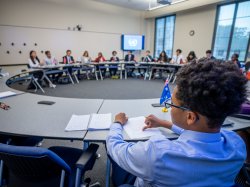During the Model United Nations Pre-college Program at Montclair State University, participants will immerse themselves in an intensive experience, taking on the role of United Nations delegates. This will be a unique opportunity to learn how diplomats conduct research, deliver statements, draft resolutions, and negotiate. Participants will also learn about different political, economic, social, and cultural systems to fully embody the role of a delegate from a country different than their own as he/she/they try to resolve some of the most challenging issues in international affairs.
Five Key Modules of the Program
- Assigned Country
Participants will be assigned a country to research and are expected to learn as much as possible about the country that they have been assigned to represent. Following a pre-designed questionnaire and using a set of pre-established reliable sources, participants will have to answer questions regarding their country’s population, people and society, military, politics, foreign policy, economics, human rights record, development, biodiversity, and environmental policies. - International Treaties
Participants will be asked to study and become acquainted with a set of key legal instruments that will inform their negotiations. These key documents include the Charter of the United Nations, the UN Declaration on Human Rights, the Rome Statute of the International Criminal Court, the Kyoto Protocol and the Paris Agreement, among others. Participants will be asked to reflect on a set of questions emanating from these readings. - Foreign Policy Tools
Participants will learn how and when to use a range of tools to pursue their foreign policy in the context of the United Nations. These tools include negotiation, mediation, arbitration, tariffs, sanctions, embargoes, development assistance, loans, sales of arms and technology, peacekeeping, and the use of military force. - National Positions
Participants will be presented with three case studies that showcase fictional crises in the areas of international peace and security, human rights, and sustainable development. They will be asked to read these cases carefully and piece together the knowledge they have acquired about the countries they are representing and the relevant international legal instruments in order to draft a national position paper that includes recommendations on how to solve the crises. - Negotiation Techniques
Participants will learn basic negotiation techniques and simulate the work of UN diplomats in a committee of the Organization. They will be required to dress in business attire and conform to the rules of procedure of the Model United Nations. Participants will be responsible for drafting statements and resolutions, delivering statements, and voting. Participants who excel in the negotiations will receive awards for outstanding and best delegate.
Sample Schedule
There will be pre-arrival assignments prior to the weeklong academy.
- Day 1 – Arrival at Montclair State University
- Day 2 – Training on rules of procedure, public speaking, drafting statements and resolutions, and negotiation technique
- Day 3 – Visit to UN headquarters in NYC and review of crises case studies
- Day 4 – Negotiations: International Peace and Security Crisis Committee
- Day 5 – Negotiations: Human Rights Crisis Committee Negotiations
- Day 6 – Negotiations: Sustainable Development Crisis Committee Negotiations
- Day 7 – Awards Ceremony
*Schedule is subject to change
Program Director
Toro Carnevali
Professor
torocarnevaa@montclair.edu
Department of Political Science and Law
Before joining Montclair State University, Professor Toro Carnevali served as a diplomat to the United Nations for 10 years. During that time he was elected vice-president of the First Committee (Disarmament and International Security) of the General Assembly and coordinator of the Security Council’s sub-working group on the nonproliferation of weapons of mass destruction.
